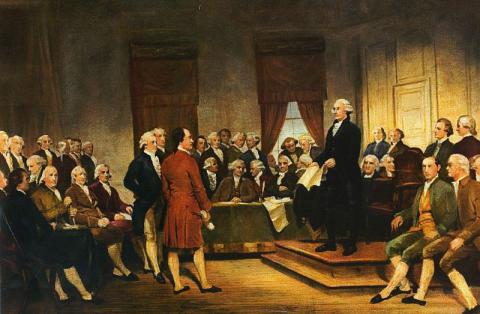Americans Don't Have a Constitutional Right to Vote — It's Time for That to Change.
On Saturday, the US Supreme Court decided — in a ruling that lacked any accompanying explanation — that a controversial voter ID law in Texas will be in effect this November, notwithstanding a contrary decision from a trial court.
The legal arguments around these kinds of voter ID laws, which tend to disproportionately disqualify non-white voters, hinge on whether they constitute a form of illegal (or unconstitutional) racial discrimination. But the fact that the legal, political, and constitutional arguments need to get pushed into a narrow racial discrimination frame is itself a symptom of the real problem: it's about time American citizens obtained a constitutional right to vote.
The missing right
The United States has had the good fortune in our history to have avoided conquest by foreign powers or military coups, which has left us with a constitutional architecture that substantially predates modern democratic norms.
When the Constitution was enacted, it did not include a right to vote for the simple reason that the Founders didn't think most people should vote. Voting laws, at the time, mostly favored white, male property-holders, and the rules varied sharply from state to state. But in the first half of the nineteenth century, the idea of popular democracy took root across the land. Property qualifications were universally abolished and the franchise became the key marker of white male political equality. Subsequent activists sought to further expand the franchise by barring discrimination on the basis of race (the 15th Amendment) and gender (the 19th Amendment) — establishing the norm that all citizens should have the right to vote.
But this norm is just a norm. There is no actual constitutional provision stating that all citizens have the right to vote, only that voting rights cannot be dispensed on the basis of race or gender discrimination. A law requiring you to cut your hair short before voting, or to dye it blue, or to say "pretty please let me vote," all might pass muster. And so might a voter ID requirement.
The legality of these kinds of laws hinge on whether they violate the Constitution's protections against race and gender discrimination, not on whether they prevent citizens from voting. As Harvard Law professor Lani Guinier has written, this "leaves one of the fundamental elements of democratic citizenship tethered to the whims of local officials."
A right whose time has come
The solution, both to America's voting access problem and to alleviating public concerns about fraud, is to establish an affirmative right to vote.
America prohibits racial and gender discrimination in voting rights because of a clear belief in the importance of voting to equal citizenship. The best way to vindicate this right would be through something like the language of a proposed constitutional amendment introduced last year by Reps. Mark Pocan and Keith Ellison, which states that "every citizen of the United States, who is of legal voting age, shall have the fundamental right to vote in any public election held in the jurisdiction in which the citizen resides."
A constitutional right to vote would instantly flip the script on anti-fraud efforts. States would retain a strong interest in developing rules and procedures that make it hard for ineligible voters to vote, but those efforts would be bounded by an ironclad constitutional guarantee that legitimate citizens' votes must be counted. A state that wanted to require possession of a certain ID card to vote, for example, would have to take affirmative steps to ensure that everyone has that ID card, or that there's a process for an ID-less citizen to cast a ballot and have it counted later upon verification of citizenship.
In that context of a solid affirmative guarantee, efforts to prevent fraudulent voting could proceed without raising the specter of vote suppression. Of course, passing new constitutional amendments is hard. But an affirmative right to vote would give voting-rights proponents a positive vision to organize around, rather than simply playing defense against various ID measures. And while it's easy for politicians to talk about their desire to secure the ballot, a Voting Rights Amendment would be difficult to oppose.
But beyond the politics, it's a good idea on the merits. It would enshrine in our Constitution a principle that we already believe: that the right to vote is an inherent attribute of citizenship and a cornerstone of civic equality.


Spread the word